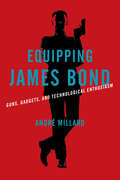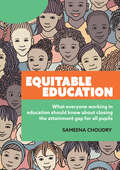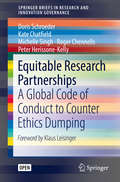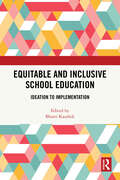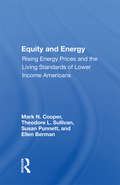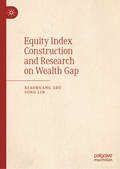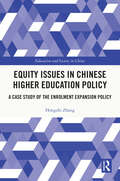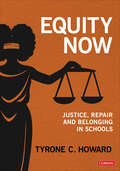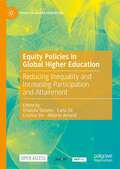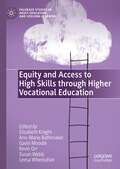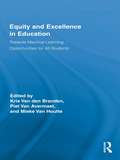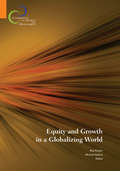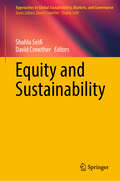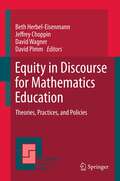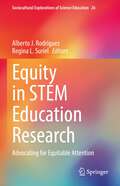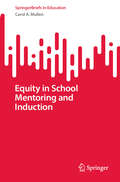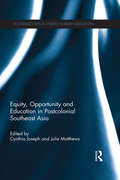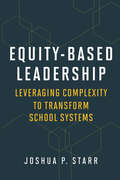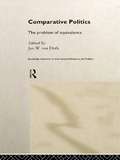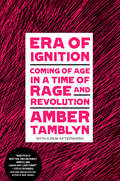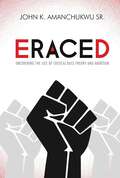- Table View
- List View
Equipping James Bond: Guns, Gadgets, and Technological Enthusiasm
by André MillardJames Bond’s amazing gadgets reveal both enthusiasm about technology and fear of its potential ramifications.The popularity of the 007 franchise depends on a seductive formula of sex, violence, and snobbery. Much of its appeal, too, lies in its gadgets: slick, somewhat improbable technological devices that give everyone’s favorite secret agent the edge over his adversaries. In Equipping James Bond, André Millard chronicles a hundred-year history of espionage technology through the lens of Ian Fleming’s infamous character and his ingenious spyware. Beginning with the creation of MI6, the British secret service, Millard traces the development of espionage technology from the advanced weaponry of the nineteenth century to the evolving threat of computer hacking and surveillance. Arguing that the gadgets in the books and films articulate the leading edge of technological awareness at the time, Millard describes how Bond goes from protecting 1950s England from criminal activity to saving a world threatened by nuclear bombs, poison gas, and attacks from space. As a modern and modernizing hero, Bond has to keep up with the times. His film franchise is committed to equipping both Bond and his adversaries with the latest technological gadgets. Simultaneously, Millard stresses, the villains and threats that Bond faces embody contemporary fears about the downside of technological change. Taking a wide-ranging look at factual (and fictional) technology, Millard views the James Bond universe as evidence for popular perceptions of technological development as both inevitably progressive and apocalyptically threatening.
Equitable Education: What everyone working in education should know about closing the attainment gap for all pupils
by Sameena ChoudryNever has a book on social justice and equitable education been so relevant.Recent events have highlighted the huge attainment gaps that exist for many pupils within the education system due to factors outside of their control. As the diversity of the pupil population increases, it is more important than ever to develop the skills, knowledge and understanding within the teaching profession around issues of equality and inclusion. This book provides trainees and teachers with an in-depth understanding of the complex issues related to the attainment of key groups of disadvantaged pupils, and practical strategies that can be deployed to address these gaps.Chapters focus on: social class, gender, English as an additional language, minority ethnic achievement, gypsy, Roma and travellers, refugee and asylum seekers, and those with special educational needs and disabilities. The book takes a stark look at the evidence and statistics, provides an overview of the key issues and considerations for each particular group, and suggests key resources and examples of good practice, along with case studies and points for reflection. Ultimately it encourages you to have high expectations of your pupils and to truly believe that you can help them realise their ambitions and aspirations. This is a powerful and timely consideration of the ways in which education has the capacity to make a difference. Packed full of evidence-informed strategies, this book considers the range of ways that schools can respond positively to build far greater equity for all…Sameena Choudry's contribution is authoritative and compelling and deserves our full attention.Dame Alison Peacock.
Equitable Principles of Maritime Boundary Delimitation
by Thomas CottierEquity emerged as a powerful symbol of aspired redistribution in international relations. Operationally, it has had limited impact in the Westphalian system of nation states - except for maritime boundary delimitations. This book deals with the role of equity in international law, and offers a detailed case study on maritime boundary delimitation in the context of the enclosure movement in the law of the sea. It assesses treaty law and the impact of the United Nations Convention on the Law of the Sea. It depicts the process of trial and error in the extensive case law of the International Court of Justice and arbitral tribunals and expounds the underlying principles and factors informing the methodology both in adjudication and negotiations. Unlike other books, the main focus is on equity and its implications for legal methodology, in particular offering further guidance in the field of international economic law.
Equitable Research Partnerships: A Global Code of Conduct to Counter Ethics Dumping (SpringerBriefs in Research and Innovation Governance)
by Doris Schroeder Roger Chennells Kate Chatfield Peter Herissone-Kelly Michelle SinghThis open access book offers insights into the development of the ground-breaking Global Code of Conduct for Research in Resource-Poor Settings (GCC) and the San Code of Research Ethics. Using a new, intuitive moral framework predicated on fairness, respect, care and honesty, both codes target ethics dumping – the export of unethical research practices from a high-income setting to a lower- or middle-income setting. The book is a rich resource of information and argument for any research stakeholder who opposes double standards in research. It will be indispensable for applicants to European Union framework programmes, as the GCC is now a mandatory reference document for EU funding.
Equitable and Inclusive School Education: Ideation to Implementation
by Bharti KaushikThis book highlights the strategies and approaches to the practice of equitable and inclusive school education, elaborating the role of various stakeholders such as teachers, special educators, parents, peers, teacher educators, educational administrators and Ed-tech firms.The aim of this book is to create an understanding of equitable and inclusive school education which is not restricted to children with disabilities but also includes children with different learning needs as well as those from socially and economically disadvantaged sections of society. The focus is on presenting practical strategies that are grounded in theory and supported with research. The significance of screening at the classroom level, development of need-based accessible learning teaching materials, customizing the pedagogy practices for inclusive classrooms, need-based examination accommodations, leveraging the potential of Information and Communication Technology (ICT) to elicit the participation of all and collaborative efforts toward realizing the optimum potential of each learner are a few basic ideas illustrated in the book with examples. The volume also discusses recent national and international policies for equitable and inclusive education, recommending courses of action for effective implementation of the existing provisions by teachers and educators.The book will be useful to students, researchers, teacher-educators, special educators, special education teacher educators, pre-service teachers and parents. It will also be an invaluable companion to in-service teachers, policymakers and educational administrators, curriculum developers and NGOs working in the field of inclusive education.
Equity And Energy: Rising Energy Prices And The Living Standards Of Lower Income Americans
by Mark N. CooperArguing that the energy price policies of the 1970s represented a major equity/efficiency trade-off and led to a dramatic decline in the living standard of lower income Americans, this book presents a comprehensive data-based assessment of the plight of lower income households between 1973 and 1983.
Equity Index Construction and Research on Wealth Gap
by Xiaohuang Zhu Song LinThis book constructs a Chinese Social Equality Index–the Mongoose Social Equality Index–with the wealth gap index as its core, and the legal equality index, the socio-cultural equality index, and the financial equality index as its supplement. The book focuses on the influence of the wealth gap on economic and social issues. Empirical research shows that there are three turning points in the influence of the wealth gap index on economic growth: discrepancy turning point, golden turning point and destructive turning point. Based on the latest data,the current expected wealth gap index in China has surpassed the destructive point. This means that wealth brought about by economic growth will largely go to the rich, which aggravates inequality and even brings forth a potential economic recession. Meanwhile, the index also indicates that, as the Chinese economy develops, social equality has been on a noticeable decline. This book will be of interest to economists, China watchers, and political scientists
Equity Issues in Chinese Higher Education Policy: A Case Study of the Enrolment Expansion Policy (ISSN)
by Hongzhi ZhangInvestigating the highly influential enrolment expansion policy in Chinese higher education, this book outlines how educational equity issues were understood and addressed in the formulation and implementation of the policy, and its impacts on the socio-economic fabric of China in the past decades.Drawing on Chinese policy documents and interviews with government and university representatives, Zhang examines the education system under the Mao era and the post-Mao era and outlines the different approaches to equity that have characterized education in China in the 20th and 21st centuries. Stephen Ball’s "policy cycle" is used as a framework to analyse the various contexts (text, discourse, and social practice) in which policy is formed. Zhang argues that education policy was not simply driven by concerns of equity but also by economic interests and political discourse. Zhang further goes on to analyse how education policy was implemented by provincial governments and highlights the tension between central policy and on-the-ground implementation.Bringing analysis of Chinese policy and research to a wider audience, this text will interest education policymakers and academics in the field of educational equity and higher education research.
Equity Now: Justice, Repair, and Belonging in Schools
by Tyrone C. HowardIf not now, when? Anchored in the tenets of justice, repair, and belonging, Equity Now is a comprehensive guide for educators that emphasizes the urgent need for immediate action to dismantle systemic barriers in education. Aimed at K-12 professionals at all levels of the education system, the book urges us to move beyond individual efforts by applying an equity lens to our policies and practices. Through honest, sustained, and critical dialogues in "brave spaces," educators can address disparities and create equity-centered school communities. Equity Now proposes a solutions-oriented approach to fostering welcoming, affirming, responsive, and rigorous learning environments. Author Tyrone C. Howard, one of the leading authorities on issues related to racial inequality in our schools, provides An equity framework grounded in justice, repair, and belonging A clear vision of equity-focused leadership Essential practices, strategies, and resources for classroom teachers Suggestion for engaging parents, families and caregivers in schools Recommendations for engaging data in an equity based way Reflection questions and additional resources at the close of each chapter This book is a must-read for educators, administrators, and policymakers who are committed to creating conditions in which our children can reach their highest potential.
Equity Now: Justice, Repair, and Belonging in Schools
by Tyrone C. HowardIf not now, when? Anchored in the tenets of justice, repair, and belonging, Equity Now is a comprehensive guide for educators that emphasizes the urgent need for immediate action to dismantle systemic barriers in education. Aimed at K-12 professionals at all levels of the education system, the book urges us to move beyond individual efforts by applying an equity lens to our policies and practices. Through honest, sustained, and critical dialogues in "brave spaces," educators can address disparities and create equity-centered school communities. Equity Now proposes a solutions-oriented approach to fostering welcoming, affirming, responsive, and rigorous learning environments. Author Tyrone C. Howard, one of the leading authorities on issues related to racial inequality in our schools, provides An equity framework grounded in justice, repair, and belonging A clear vision of equity-focused leadership Essential practices, strategies, and resources for classroom teachers Suggestion for engaging parents, families and caregivers in schools Recommendations for engaging data in an equity based way Reflection questions and additional resources at the close of each chapter This book is a must-read for educators, administrators, and policymakers who are committed to creating conditions in which our children can reach their highest potential.
Equity Policies in Global Higher Education: Reducing Inequality and Increasing Participation and Attainment (Issues in Higher Education)
by Alberto Amaral Orlanda Tavares Cristina Sin Carla SáThis book discusses and analyses global policies and practices aimed at promoting equity in higher education participation and attainment. Although the massification of higher education systems has facilitated the participation of students from deprived backgrounds, socioeconomic inequalities persist in access to the most prestigious institutions and programmes. Privileged students benefit from a number of advantages in the competition for selective and scarce places: access to information, lower aversion to debt, higher expectations, better previous schooling and higher academic achievement. The chapters present a critical analysis of equity policies in different countries – with or without affirmative action policies, within a context of neoliberal policies or within a social democratic model – and the reasons why they have failed to promote equity and fairness, preventing students from achieving their full educational potential.This is an open access book.
Equity and Access to High Skills through Higher Vocational Education (Palgrave Studies in Adult Education and Lifelong Learning)
by Ann-Marie Bathmaker Kevin Orr Gavin Moodie Leesa Wheelahan Elizabeth Knight Susan WebbThis book explores new and distinctive forms of higher vocational education across the globe, and asks how the sector is changing in response to the demands of the 21st century. These new forms of education respond to two key policy concerns: an emphasis on high skills as a means to achieve economic competitiveness, and the promise of open access for adults hitherto excluded from higher education. Examining a range of geographic contexts, the editors and contributors aim to address these contexts and highlight various similarities and differences in developments. They locate their analyses within the various political and socio-economic contexts, which can make particular reforms possible and achievable in one context and almost unthinkable in another. Ultimately, the book promotes a critical understanding of evolving provisions of higher vocational education, refusing assumptions that policy borrowing from apparently ‘successful’ countries offers a straightforward model for others to adopt.
Equity and Efficiency in the Reform of Price Subsidies
by Sanjeev Gupta Robert Gillingham Juan Pablo CordobaA report from the International Monetary Fund.
Equity and Excellence in Education: Towards Maximal Learning Opportunities for All Students (Routledge Research in Education)
by Piet Van Avermaet Mieke Van Houtte Kris Van den BrandenThroughout the world, equity and excellence in education is a major issue of concern. International comparative studies such as those carried out by OECD (PISA) have launched a worldwide debate on the effectiveness of educational systems (macro level), schools (meso level) and teachers (micro level) in terms of enhancing equity and excellence. Inspired by the OECD research and spurred by national policy-making, quantitative and qualitative research studies have recently been conducted in different parts of the globe aiming to provide deeper insight into the crucial variables that have an impact on equity, excellence or both. Among the variables that have been identified as crucial in this respect are the pupils' gender and their socio-economic and linguistic background, teachers' expectations, cognitions and pedagogical approach in the classroom, parental support, financial aspects, educational policies (e.g. priority policies, multilingual policies, early start policies), and variables related to the structure of the educational structure and system (e.g. compulsory school age, comprehensive systems, support structures, system variables enhancing spread of learners). This volume aims to compile a rich collection of research-based contributions, providing a state-of-the-art resource on what we know about this topic today.
Equity and Growth in a Globalizing World
by Michael Spence Ravi KanburWhat has been the evolution of poverty and equity during the recent globalizing decades? How have poor countries fared on the Millennium Development Goals? What role does wealth inequality play in the level and efficiency of investment and, hence, in economic growth? Is gender equity a smart pro-growth strategy as well as a pro-poor one? How is equality different from equality of opportunity, and should policy makers pursue one, the other, or both? In formulating distributional strategies, should the middle class be integrally considered, or should the focus be entirely on the poorest of the poor? What are the precise impacts of globalization on poverty and equity, and what are the policy implications of these impacts? Is the problem with globalization that a key element is missing-the globalization of labor employment? What is the role of international migration in the evolution of equity within and between nations? This book has been prepared for the Commission on Growth and Development to evaluate the state of knowledge on the relationship between poverty, equity, and globalization. It considers a range of questions on poverty and equity within nations, and the policy frameworks that can best address distributional concerns as the basis for a growth strategy. It also examines the important issue of equity between nations, in particular the possible role of international migration in alleviating this inequity. Written by prominent analysts in their fields, 'Equity and Growth in a Globalizing World' seeks to create a better understanding of the interactions between globalization, growth, and different dimensions of equity and poverty, and to inform policy makers of possible policy levers to address central concerns in the debates in this area.
Equity and Sustainability (Approaches to Global Sustainability, Markets, and Governance)
by David Crowther Shahla SeifiThis book delves into the multifaceted concept of sustainability, placing a particular emphasis on the social dimension and its intersection with economic and environmental considerations. It examines how individuals, corporations, and institutions can adapt their behaviors to align with sustainable practices. Through a global perspective, the book explores various aspects of behavior changes required for sustainability, highlighting diverse approaches adopted in different regions around the world. One of the central themes explored in this book is the notion of equity in sustainability. While it is acknowledged that complete equality is unattainable, the book argues that achieving fairness in outcomes is essential for the stability and longevity of sustainable practices. Without equity, there is a risk of social unrest and instability, which could undermine the sustainability agenda. Drawing on contributions from scholars representing diverse international backgrounds, the book offers fresh perspectives and innovative solutions to the challenges of sustainability. Rooted in the tradition of the Social Responsibility Research Network (SRRNet), this book embodies the network's ethos of promoting dialogue, sharing best practices, and seeking relevant solutions. It aims to inspire new thinking and action toward a more sustainable and equitable future for all, presenting a blend of academic rigor and practical insights. Through its exploration of sustainability from a social perspective, this book contributes to the ongoing discourse on how to address the pressing global challenges of our time.
Equity in Discourse for Mathematics Education
by David Wagner Beth Herbel-Eisenmann David Pimm Jeffrey ChoppinThis book explores the connection between the ways people speak in mathematics classrooms and their opportunities to learn mathematics. The words spoken, heard, written and read in mathematics classrooms shape students' sense of what mathematics is and of what people can do with mathematics. The authors employ multiple perspectives to consider the means for transformative action with respect to increasing opportunities for traditionally marginalized students to form mathematical identities that resonate with their cultural, social, linguistic, and political beings.
Equity in STEM Education Research: Advocating for Equitable Attention (Sociocultural Explorations of Science Education #26)
by Alberto J. Rodriguez Regina L. SurielThis book focuses on the creative and transformative work of scholars who are advancing social justice through science/STEM education with limited resources. It draws attention to the significant body of work being conducted in various contexts so that readers could reflect and appreciate how much broader and transformative our impact could be if funding agencies, policy makers, and other researchers would widen their perspective and seek to promote social justice-driven scholarship. Public funding for STEM research on K-12 and teacher education that targets special populations is often limited and tends to favor mainstream research. This book contains case studies on innovative and promising STEM research with a focus on equity, diversity and social justice that are funded with limited or no public funding. It also presents anecdotes from authors in relation to their struggles in either securing funding for their reported study or seeking to publish its findings. This provides more context to the challenges of conducting non-mainstream research in science/STEM education. Most of the contributors are scholars of color and/or women conducting research with traditionally marginalized populations in science/STEM. Thus, this book offers an additional venue to share the voices of marginalized scholars and allies seeking to broaden our understanding of the challenges and successes of promoting equity, diversity, and social justice in various educational contexts.
Equity in School Mentoring and Induction (SpringerBriefs in Education)
by Carol A. MullenThis book provides an original mentoring/induction framework that spotlights equity in schools. In it, support-accessibility-collaboration-equity (SACE) is presented as a powerful structure for re-imagining mentoring/induction, especially for busy practitioners. Current mentoring models refer to the three pillars of support, accessibility, and collaboration (SAC). This book introduces an additional perspective, that is, the aspect of equity/justice in regard to career entry and socialization. The SACE framework extends the SAC model and fills a gap in the literature. Schools that integrate equity in mentoring/induction can anticipate the equitable support of new teachers, among other benefits. This research-informed work offers accessible theory on an important issue in the world of practice. The focus is on equity, a much-neglected area in mentoring/induction knowledge. Additionally, practical activities and case studies bring theory to life in everyday professional practice. This reader-friendly book appeals to a wide, global audience and is useful for early career teachers, mentors, teacher educators, and policymakers. It is of particular interest to those with a passion for social justice and equity in professional contexts. Practitioners seeking ways to improve their program design and delivery from an equity perspective can draw on this resource for their own purposes. University teachers and students in educational leadership and teacher education programs and mentoring/induction researchers can explore the book’s social justice ideas to enrich theory and practice.
Equity, Diversity & Canadian Labour
by David Rayside Gerald HuntIn recent years, the Canadian labour movement has undergone fundamental change in response to demands for greater inclusion and representation by women, visible and sexual minorities, and people with disabilities. Equity, Diversity, and Canadian Labour explores the specific challenges put to outmoded attitudes and practices, charting the efforts made by organized labour in Canada towards addressing discrimination in the workplace and within unions themselves. While there has been a fair amount of progress in this regard, persistent impediments to equity and uneven responsiveness within and across diversity issues remain.This collection of original essays brings together contributors from a variety of academic backgrounds - women's studies, political science, sociology, industrial relations - and from the labour movement itself to examine union policies, practices, and cultures with respect to diversity issues. The first comprehensive analysis of Canadian labour's response to challenges on gender, race, disability, and sexual orientation issues since the 1980s, the book aims to highlight the structural and cultural developments that have taken place within the labour movement around equality rights, and to provide a forum for debates about the extent to which union democracy has been reshaped as a result of equity activism.
Equity, Opportunity and Education in Postcolonial Southeast Asia (Routledge Critical Studies in Asian Education)
by Cynthia Joseph Julie MatthewsEquity, Opportunity and Education in Postcolonial Southeast Asia addresses the ways in which colonial histories, nationalist impulses and forces of globalization shape equity and access to education in Southeast Asia. Although increasingly identified as a regional grouping (ASEAN), Malaysia, Indonesia, Burma, Thailand, Singapore and the Philippines are known for their vastly different state structures, political regimes, political economies and ethnocultural and religious demography. The expert contributors to this volume investigate educational access and equity for citizens, ethnic and religious minorities, and indigenous people within these countries. The subject of education is framed within the broader national and local challenges of achieving equity and social justice. This book examines the dimensions of (post)colonialism, nationalism, and globalisation as played out within different international educational contexts. Chapters include: Understanding the Cultural Politics of Southeast Asian Education through Postcolonial Theory Downplaying Difference: Representations of Diversity in Contemporary Burmese Schools and Educational Equity Learner Centered Pedagogy in Post-Conflict Timor-Leste: For the Benefit of the Learner or the Learned Technology of Dominance, Technology of Liberation: Education in Colonial and Postcolonial Cambodia Change and Continuity in the History of Vietnamese Higher Education Colonization by Stealth: The Case of Thailand Education Politics in Postcolonial Malaysia: Ethnicity, Difference and Inequalities The Singapore Education Journey: From Colonialism to Globalism
Equity-Based Leadership: Leveraging Complexity to Transform School Systems
by Joshua P. StarrWith a visionary approach to school improvement, Equity-Based Leadership proposes a framework to support system leaders seeking to organize change and achieve more equitable education.In this ambitious yet pragmatic work, Joshua P. Starr makes the case that intentional and attentive district leadership can bring about continuous improvement in schools. When district reforms are conceived with social justice in mind, Starr explains, schools move toward fulfilling the longstanding promise of equitable education in America.Starr asserts that the essential goal of good system leadership lies in designing, implementing, and sustaining comprehensive strategies for school reform, in collaboration with school leaders, educators, and community shareholders. Drawing on his own experiences and those of other distinguished superintendents, he offers core practices that system leaders can use to ensure that the mission of their district is upheld throughout any change process and that precious time and funding are used judiciously.Recognizing that there is no single path to transformation, Starr sets forth a flexible, customizable agenda for district reform that concentrates on six elements, or entry points. Starr's first entry point is curriculum content, as teaching and learning are the fundamental goals of a school system. But he goes further to advocate for a deep dive into the organization and alignment of the system itself, via deliberate support of shared values; explicit and transparent decision-making; resource allocation in line with vision and need; talent management to achieve new levels of educator performance; and nourishment of school culture.Additionally, Starr brings together a wide range of real-world examples, evidence-based practices, and sensible advice to guide district leaders in aligning their systems around a coherent equity strategy.This bold new approach to transforming educational systems confidently guides the higher-level decision-making of leaders—not only superintendents but also school board members, cabinet members, and central office administrators—within the context of district-wide efforts to make education better for all students.
Equivalence in Comparative Politics: The Problem Of Equivalence (Routledge Advances in International Relations and Global Politics)
by Jan W. van DethThis book tackles the issues involved and explores strategies to deal with many of the problems of establishing equivalence. Each contribution focuses on a theoretically relevant theme, such as: tolerance; political values; religious orientations; gender roles; voluntary associations; party organizations and party positions; democratic regimes, and the mass media. Each chapter covers different topics, methods, data and countries, making use of research to show the problems of finding similar or identical indicators in realistic research settings.
Era of Ignition: Coming of Age in a Time of Rage and Revolution
by Amber TamblynA passionate and deeply personal exploration of feminism during divisive times by actor, filmmaker, and activist Amber TamblynIn her late twenties, Amber Tamblyn experienced a crisis of character while trying to break out of the confines of the acting career she'd forged as a child in order to become the writer and director she dreamed of being as an adult. After a particularly low period fueled by rejection and disillusionment, she grabbed hold of her own destiny and entered into what she calls an Era of Ignition--namely, the time of self-reflection that follows in the wake of personal upheaval and leads to a call to action and positive change. In the process of undergoing this metaphysical metamorphosis, she realized that our country was going through an Era of Ignition of its own. She writes: "No longer stuck in a past we can't outrun and a future we must outgrow, we are a nation that is actively confronting our values and agitating for change. We are in an age when activism becomes direct action, when disagreement becomes dissention, when dissatisfaction becomes protest, when accusations become accountability, and when revolts become revolutions." Through her fierce op-eds and tireless work as one of the founders of the Time's Up organization, Amber has emerged as a bold, outspoken, and respected advocate for women's rights. In Era of Ignition, she addresses gender inequality and the judgment paradigm, misogyny and discrimination, trauma and the veiled complexities of consent, white feminism and pay parity, reproductive rights and sexual assault--all told through the very personal lens of her own experiences, as well as those of her Sisters in Solidarity. At once an intimate meditation and public reckoning, Era of Ignition is a galvanizing feminist manifesto that is required reading for everyone attempting to understand the world we live in and help change it for the better.
Eraced: Uncovering the Lies of Critical Race Theory and Abortion
by John K. AmanchukwuTucked in the Old Testament book of Isaiah is a warning meant for ancient Judah, but it might as well have been written for twenty-first century America: &“Woe to those who call evil good and good evil, who put darkness for light and light for darkness&” (Isaiah 5:20). Abortion and critical race theory are twin evils born of the same diabolical monster: racism. And yet, there are many in the church who want to call them good, even as America begins to unravel under their influence. In Eraced, John Amanchukwu Sr. dispels the myths surrounding abortion and critical race theory, and uncovers the Left's sinister plot to destroy the Black community and divide the church. Along the way, he brings to light important gospel truths to help all believers learn to think biblically about some of the most important and explosive issues of our day.
